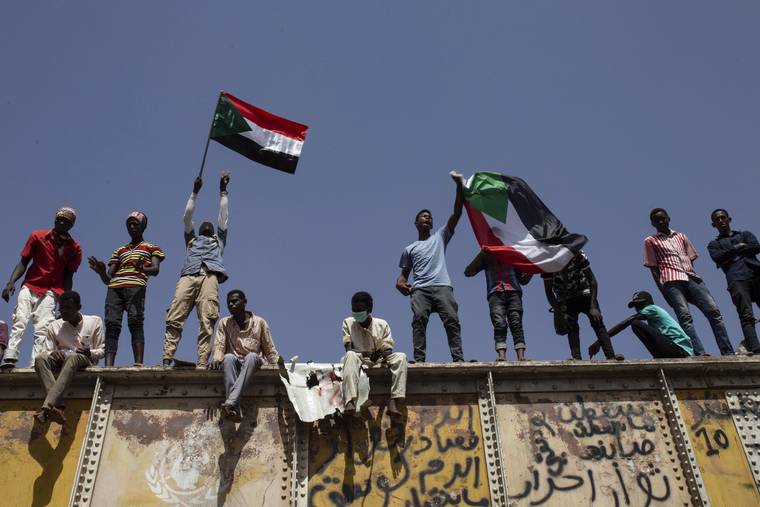KHARTOUM, Sudan — Protesters in Sudan on Friday voiced concerns that the ruling transitional military council might disperse the Khartoum sit-in that helped bring down longtime dictator Omar al-Bashir last month after a general dismissed it as “a threat to the revolution.”
Maj. Gen. Othman Hamed of Sudan’s paramilitary Rapid Support Forces, which has its roots in Sudan’s Janjaweed militias accused of genocide in the Darfur region, accused sit-in participants Thursday of attracting prostitutes and hashish sellers. He also said demonstrators had thrown stones at soldiers.
The sit-in “has become a hub for all kind of criminal acts, and has become an unsafe place and has become a threat to the revolution and the revolutionaries, and is threat to the national security of the state,” Hamed said. “Therefore, we at the Rapid Support Forces in coordination with other security forces … are responsible for restoring the safety of the citizens (and will) carry out legal procedures to stop these violations and this behavior.”
He did not elaborate on what that would mean for peaceful demonstrators.
“Such statements reveal the intention of the military council, which is not a partner to our revolution, to disperse the sit-in and to monopolize power,” Tarek Abdel Meguid, a leader of the Forces for the Declaration of Freedom and Change, a coalition of political groups and parties representing protesters.
He dismissed allegations of illicit activities leveled against demonstrators and alleged that elements belonging to the old regime are the ones committing such acts near the sit-in to tarnish the image of revolutionaries.
“Our people are holding a peaceful sit-in and they are holding religious as well as cultural rituals there,” said Abdel Meguid, also a leader of Sudan’s communist party.
Sudan’s armed forces posted a video on its official Facebook page Friday apparently showing young men vandalizing an army vehicle, alleging that it was shot during the sit-in. Earlier, another video showed young men hurling rocks at moving cars near the sit-in. The caption read: “Chaos in the heart of the capital. We will put an end to the chaos, God willing.”
The Sudanese Foreign Ministry also issued an alert to all foreign embassies and international organizations operating in Sudan asking their staff to avoid the sit-in area in Khartoum and all protest sites across the country “for the sake of their own safety and security.”
The threat against the sit-in comes as negotiations between civilian forces and the military remained deadlocked. The two parties are split over the make-up and leadership of the sovereign council that would rule the country during the transitional period. The protesters demand “limited military representation” on the council but the ruling generals refuse to relinquish power.
Protesters had staged a two-day strike earlier this week to pressure the military, to no avail. They have threatened to launch a civil disobedience over the ongoing deadlock.
On Thursday, Gen. Abdel Fattah al-Burhan, head of the military council, dashed hopes for an interim civilian government during his speech at an Arab summit in Saudi Arabia. He signaled that the military would remain in power during “a short transitional period” that would come to a close with the election of a new government. His statement aroused fears that the military might call for early elections if negotiations remain stalled — a scenario that protesters vehemently oppose.
Protesters insist no elections should be held before three years so that civilian leaders can dissolve all social and political networks of al-Bashir’s old party and purge all state institutions.
Earlier on Friday, the satellite news channel Al-Jazeera reported that Sudanese authorities shut down its Khartoum bureau and banned its journalists from reporting.
“The network sees this as an attack on media freedom, professional journalism, and the basic tenets of the right for people to know and understand the reality of what is happening in Sudan,” Al-Jazeera said in a statement.
The Qatar-funded satellite network has long drawn the ire of Egypt, Bahrain, Saudi Arabia and the United Arab Emirates, the four nations now locked in a nearly two-year boycott of Doha over a political dispute. They accuse its Arabic-language services of stirring dissent and backing Islamists, whom the nations largely see as a threat to their own governments.
———
ElHennawy reported from Cairo.


